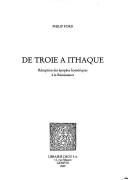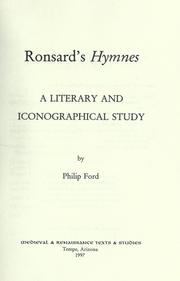| Listing 1 - 10 of 28 | << page >> |
Sort by
|

ISBN: 9782600012126 2600012125 Year: 2007 Volume: 436 Publisher: Genève Droz
Abstract | Keywords | Export | Availability | Bookmark
 Loading...
Loading...Choose an application
- Reference Manager
- EndNote
- RefWorks (Direct export to RefWorks)
Vers 1353, Pétrarque reçut de la part de l’ambassadeur byzantin en Italie un manuscrit grec d’Homère. Cet événement mit fin à une absence plusieurs fois séculaire des épopées homériques en Europe occidentale, même si la légende de la guerre de Troie et des errances d’Ulysse était connue au public médiéval par le biais de sources latines et vernaculaires. Cette étude se propose de tracer le retour des épopées homériques, lui-même étroitement lié au développement de l’hellénisme, à la conscience occidentale. Grâce à l’imprimerie, le texte grec d’Homère est devenu disponible dès 1488, et même avant cette date des traductions latines de l’Iliade avaient vu le jour. Néanmoins, le style d’Homère, considéré comme rude et inélégant par ses premiers lecteurs, a de quoi rendre perplexes certains humanistes de l’époque, ce qui ne les empêche pas de voir en lui un poète divinement inspiré. Peu à peu, la res publica litterarum s’y habitue, aidée dans un premier temps par les exilés grecs de Constantinople et les humanistes italiens, ensuite par les humanistes de l’Europe du nord, notamment Philipp Mélanchthon et ses élèves. La première partie de cette étude examine la diffusion de l’Iliade et de l’Odyssée à l’échelle européenne, en identifiant et analysant les éditions, les traductions latines et les commentaires qui paraissent dès 1473 jusqu’à la fin du XVIe siècle. L’interprétation du texte, souvent influencée par les allégeances confessionnelles des commentateurs, reçoit une attention particulière : quelle est l’influence des exégètes anciens sur les humanistes de la Renaissance ? comment est-il possible de réconcilier les idées religieuses et philosophiques de l’aède grec avec le christianisme ? La seconde partie de l’étude se concentre sur la réception d’Homère en France, où Guillaume Budé et Jean Dorat ont inspiré des générations successives d’écrivains, profondément influencés par l’esthétique et par la philosophie d’Homère. En particulier, l’emploi des épopées fait par des prosateurs comme Jean Lemaire de Belges et François Rabelais, et par les poètes de la Pléiade est analysé. Les traductions françaises d’Homère sont également examinées. Enfin, nous voyons Jules-César Scaliger mettre en doute l’esthétique homérique et préparer la voie pour le classicisme du grand siècle. Cet ouvrage est complété par une bibliographie détaillée de toutes les éditions d’Homère imprimées jusqu’en 1600.
Comparative literature --- anno 1400-1499 --- anno 1500-1599 --- Europe --- European literature --- History and criticism --- Homer --- Appreciation --- Influence --- Criticism and interpretation --- 875 HOMERUS --- 094 HOMERUS --- 094:875 --- Griekse literatuur--HOMERUS --- Oude en merkwaardige drukken. Kostbare en zeldzame boeken. Preciosa en rariora--HOMERUS --- Oude en merkwaardige drukken. Kostbare en zeldzame boeken. Preciosa en rariora-:-Griekse literatuur --- History and criticism. --- 094:875 Oude en merkwaardige drukken. Kostbare en zeldzame boeken. Preciosa en rariora-:-Griekse literatuur --- 094 HOMERUS Oude en merkwaardige drukken. Kostbare en zeldzame boeken. Preciosa en rariora--HOMERUS --- 875 HOMERUS Griekse literatuur--HOMERUS --- Homeros --- Homère --- Appreciation. --- Criticism and interpretation. --- Influence. --- Homerus --- Hóiméar --- Hūmīrūs --- Gomer --- Omir --- Omer --- Omero --- Ho-ma --- Homa --- Homérosz --- האמער --- הומירוס --- הומר --- הומרוס --- هومر --- هوميروس --- 荷马 --- Ὅμηρος --- Гамэр --- Hamėr --- Омир --- Homero --- 호메로스 --- Homerosŭ --- Homērs --- Homeras --- Хомер --- ホメーロス --- ホメロス --- Гомер --- Homeri --- Hema --- Pseudo-Homer --- Pseudo Omero --- European literature - Renaissance, 1450-1600 - History and criticism --- Homer - Appreciation --- Homer - Influence --- Homer - Criticism and interpretation --- Homer - Translations
Book
ISBN: 9789004245396 9004245405 9004245391 9789004245402 1299154859 9781299154858 Year: 2013 Volume: 9 Publisher: Leiden Brill
Abstract | Keywords | Export | Availability | Bookmark
 Loading...
Loading...Choose an application
- Reference Manager
- EndNote
- RefWorks (Direct export to RefWorks)
Poetry --- Classical Latin literature --- French literature --- anno 1500-1599 --- French poetry --- Latin poetry, Medieval and modern --- Latin literature, Medieval and modern --- History and criticism --- French poetry - 16th century - History and criticism --- Latin poetry, Medieval and modern - France - History and criticism
Book
ISBN: 9780902205642 0902205641 Year: 2008 Publisher: Cambridge Cambridge University Library
Abstract | Keywords | Export | Availability | Bookmark
 Loading...
Loading...Choose an application
- Reference Manager
- EndNote
- RefWorks (Direct export to RefWorks)
Book collectors --- Montaigne, Michel de, --- De Botton, Gilbert, --- Library --- Books and reading --- Cambridge University Library --- 094 DE MONTAIGNE, MICHEL --- 017.2 <44> DE MONTAIGNE, MICHEL --- 017.2 <44> DE BOTTON, GILBERT --- Oude en merkwaardige drukken. Kostbare en zeldzame boeken. Preciosa en rariora--DE MONTAIGNE, MICHEL --- Catalogi van persoonsbibliotheken--Frankrijk--DE MONTAIGNE, MICHEL --- Catalogi van persoonsbibliotheken--Frankrijk--DE BOTTON, GILBERT --- Exhibitions --- 017.2 <44> DE BOTTON, GILBERT Catalogi van persoonsbibliotheken--Frankrijk--DE BOTTON, GILBERT --- 017.2 <44> DE MONTAIGNE, MICHEL Catalogi van persoonsbibliotheken--Frankrijk--DE MONTAIGNE, MICHEL --- 094 DE MONTAIGNE, MICHEL Oude en merkwaardige drukken. Kostbare en zeldzame boeken. Preciosa en rariora--DE MONTAIGNE, MICHEL --- Montaigne, Michel de, - 1533-1592 --- Montaigne, Michel de, - 1533-1592 - Bibliography --- De Botton, Gilbert, - 1935-2000 - Library --- Montaigne, Michel de, - 1533-1592 - Bibliography - Exhibitions --- Montaigne, Michel de, - 1533-1592 - Books and reading - Exhibitions --- De Botton, Gilbert, - 1935-2000
Book
ISSN: 09257683 ISBN: 1299154859 9004245405 9789004245402 9789004245396 9004245391 Year: 2013 Volume: v. 9 Publisher: Leiden ; Boston : Brill,
Abstract | Keywords | Export | Availability | Bookmark
 Loading...
Loading...Choose an application
- Reference Manager
- EndNote
- RefWorks (Direct export to RefWorks)
In Virgil's third Eclogue , Palaemon concludes the poetry competition between Menalcas and Damoetas by saying that he cannot choose between them, a judgment that is emblematic of the contest between Neo-Latin and vernacular poetry in Renaissance France. Both forms of poetry draw on similar roots, both are equally accomplished, and the contest between them is largely amicable. The Judgment of Palaemon illustrates the almost symbiotic relationship between Renaissance Latin and French poetry, while exploring poets' motivation for choosing one language over another, the different challenges each form of writing involved, and the extent of the collaboration between different language communities. It focuses on some of the major writers of the period, as well as less well known ones, and on genres specific to humanist poetry. It shows that composing in Latin was often considered more natural, at a time when many Frenchmen's mother tongue was a non-standard French dialect or distinct language.

ISBN: 0866981977 Year: 1997 Publisher: Binghamton (N.Y.) : Medieval & Renaissance Texts & Studies,
Abstract | Keywords | Export | Availability | Bookmark
 Loading...
Loading...Choose an application
- Reference Manager
- EndNote
- RefWorks (Direct export to RefWorks)
Book
Year: 1642 Publisher: London : Printed for H. Blunden,,
Abstract | Keywords | Export | Availability | Bookmark
 Loading...
Loading...Choose an application
- Reference Manager
- EndNote
- RefWorks (Direct export to RefWorks)
eebo-0158
Book
Year: 1642 Publisher: London : Printed for H. Blunden,
Abstract | Keywords | Export | Availability | Bookmark
 Loading...
Loading...Choose an application
- Reference Manager
- EndNote
- RefWorks (Direct export to RefWorks)
eebo-0018
Commissions of array --- Warwick, Robert Rich, --- Great Britain --- York (England) --- History --- History
Book
Year: 1683 Publisher: London : Printed for Benjamin Clark ...,
Abstract | Keywords | Export | Availability | Bookmark
 Loading...
Loading...Choose an application
- Reference Manager
- EndNote
- RefWorks (Direct export to RefWorks)
eebo-0062
Book
Year: 2005 Publisher: Genève Droz
Abstract | Keywords | Export | Availability | Bookmark
 Loading...
Loading...Choose an application
- Reference Manager
- EndNote
- RefWorks (Direct export to RefWorks)
Article
Abstract | Keywords | Export | Availability | Bookmark
 Loading...
Loading...Choose an application
- Reference Manager
- EndNote
- RefWorks (Direct export to RefWorks)
| Listing 1 - 10 of 28 | << page >> |
Sort by
|

 Search
Search Feedback
Feedback About UniCat
About UniCat  Help
Help News
News